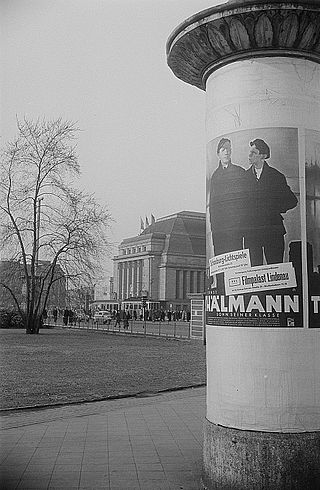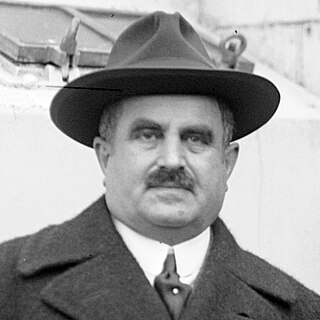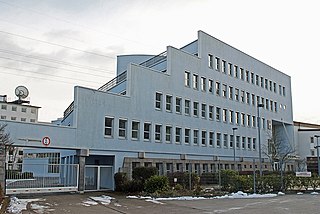Related Research Articles
UFA GmbH, shortened to UFA, is a film and television production company that unites all production activities of the media conglomerate Bertelsmann in Germany. Its name derives from Universum-Film Aktiengesellschaft, a major German film company headquartered in Babelsberg, producing and distributing motion pictures from 1917 until the end of the Nazi era. The name UFA was revived by Bertelsmann for an otherwise unrelated film and television outfit, UFA GmbH.

Ernst Thälmann is an East German film in two parts about the life of Ernst Thälmann, leader of the Communist Party of Germany during much of the Weimar Republic, directed by Kurt Maetzig and starring Günther Simon in the title role. The first part, Ernst Thälmann - Sohn seiner Klasse, was released in 1954. It was followed by the 1955 sequel. Ernst Thälmann - Führer seiner Klasse.

Paul Davidson was a German film producer.
Operetta films are a genre of musical films associated with, but not exclusive to, German language cinema. The genre began in the late 1920s, but its roots stretch back into the tradition of nineteenth century Viennese operettas.
Berolina Film was a film production company which operated in West Germany between 1948 and 1964. The film's production was supervised by the experienced Kurt Ulrich and was based in West Berlin. The company helped launch a cycle of popular heimatfilm made in the 1950s.
Prussian films were a cycle of historical films made in Germany during the Weimar (1918–1933) and Nazi (1933–1945) eras noted for their general glorification of Prussian history and its military. The films are set during the eighteenth and nineteenth centuries. They particularly focused on Frederick the Great, who ruled Prussia from 1740 to 1786 greatly expanding its territory. The films were extremely popular with German audiences and an estimated forty four were produced by the end of the Second World War.
Ernst Waldow was a German film actor. He appeared in more than 160 films during his career.
Andrew Thorndike was a German documentary film director. He directed 16 films between 1949 and 1977. His 1950 documentary, Der Weg nach oben, won the Best Documentary Film at the Karlovy Vary International Film Festival in 1951. He was a member of the jury at the 5th Moscow International Film Festival. At the 11th Moscow International Film Festival in 1979, he was awarded the Honorable Prize for his contribution to cinema.

The Ufa-Palast am Zoo, located near Berlin Zoological Garden in the New West area of Charlottenburg, was a major Berlin cinema owned by Universum Film AG, or Ufa. Opened in 1919 and enlarged in 1925, it was the largest cinema in Germany until 1929 and was one of the main locations of film premières in the country. The building was destroyed in November 1943 during the Bombing of Berlin in World War II and replaced in 1957 by the Zoo Palast.
Joachim Brennecke was a German stage and film actor. During the Second World War he had prominent roles in Nazi propaganda films such as Attack on Baku and 5 June.
Helmut Weiss was a German actor, screenwriter, and film director. He was notable for directing Tell the Truth the first film produced in what was to become the future West Germany after the Second World War. It was made in Hamburg in the British Zone of Occupation. Much of the film had already been made at the UFA studios in Berlin shortly before the arrival of the Red Army, but Weiss dramatically re-shot it. The film was significant in its use of outdoor locations in common with other post-war rubble films.
Herbert Wilk (1905–1977) was a German stage, television and film actor. He emerged as a screen actor during the Nazi era, appearing in war films such as U-Boote westwärts (1941). However the bulk of his career came after the Second World War. After initially appearing in films made by the East German studio DEFA, he largely worked in West German television for the remainder of his career.
Gisela von Collande was a German film actress.
Phoebus Film or Phoebus-Film was a German film production and distribution company active during the silent era. It was one of the medium-sized firms established during the early boom years of the Weimar Republic. It had a distribution agreement with the American studio MGM.

Aafa Film or Aafa-Film was a German film production and distribution company which operated during the 1920s and 1930s. Established in 1920 as Radio-Film the company was controlled by the producer Gabriel Levy and the director Rudolf Dworsky. The company was one of the leading producers of the Weimar Republic, and survived the transition from silent to sound film in 1929. It made the first German full sound film It's You I Have Loved that year. During the early 1930s Aafa produced a number of mountain films directed by Arnold Fanck. It also made a multi-language version musical Lieutenant, Were You Once a Hussar? (1930).

The Tempelhof Studios are a film studio located in Tempelhof in the German capital of Berlin. They were founded in 1912, during the silent era, by German film pioneer Alfred Duskes, who built a glass-roofed studio on the site with financial backing from the French company Pathé. The producer Paul Davidson's PAGU then took control and constructed a grander structure. The First World War propaganda drama The Yellow Passport, the historical comedy Madame DuBarry and the expressionist 1920 silent film The Golem were made there by PAGU.

The Wandsbek Studios are film production and television studios located in Wandsbek, a district of the German city of Hamburg.
Deutsche London Film or Deutsche London-Film was a West German film distribution company active from 1948 to 1956. Handling both domestic productions and imports, and concentrating on popular film genres, it established itself as one of the bigger distributors. This took place during the economic recovery of the German film industry in the post-Second World War period, as audiences reached peak numbers by the mid-1950s.
Eiko Film was a German film production company of the silent era. It was established in 1912 by the producer Franz Vogel and swiftly became one of Germany's more important companies. Having initially produced its films at the Rex Film studios in Berlin, the company moved to construct the Marienfelde Studios in the suburb of that name. A glasshouse studio, it was part of Germany's growing film infrastructure. During the First World War era, when foreign imports were largely excluded from the German market, the company enjoyed success with its productions. In 1922 the company and its Marienfelde Studios were acquired by Terra Film, although the name Eiko was used by productions released by the rival National Film until later in the decade.